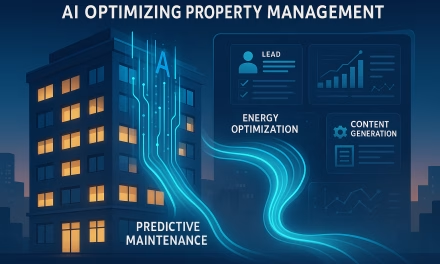# PropTech Revolution: AI Drives 36% Growth in Real Estate Technology Market
The real estate industry is experiencing a technological renaissance in 2025, with artificial intelligence-powered Property Technology (PropTech) driving unprecedented growth and fundamentally transforming how properties are bought, sold, and managed. According to recent analysis from The Business Research Company, the AI real estate market has expanded dramatically from $222.65 billion in 2024 to $303.06 billion in 2025, representing a remarkable compound annual growth rate of 36.1%.
This explosive growth reflects a fundamental shift in an industry that has traditionally been slow to embrace digital innovation. Real estate professionals and consumers alike are discovering that AI-powered tools can address longstanding inefficiencies while creating entirely new possibilities for property transactions and management. The transformation is so comprehensive that PropTech is no longer considered an optional enhancement—it has become the new standard for competitive real estate operations.
At the forefront of this revolution is the emergence of platforms like Housivity, which exemplify the new generation of real estate technology companies that seamlessly bridge the gap between cutting-edge technology and the trust-based relationships that remain central to real estate transactions. These platforms demonstrate how AI can enhance rather than replace the human elements that make real estate transactions successful.
One of the most significant innovations driving this growth is the development of hyper-personalized property recommendation systems. These AI algorithms analyze vast amounts of data including user preferences, past search behavior, budget constraints, and lifestyle patterns to recommend properties with unprecedented accuracy. Unlike traditional property search methods that rely on basic filters, these AI systems understand nuanced preferences and can identify properties that match a buyer’s needs even when those needs haven’t been explicitly articulated.
The impact of virtual site visits and 3D property tours represents another transformative development in the PropTech landscape. Buyers can now experience properties remotely through sophisticated virtual reality environments, 3D walkthroughs accessible via smartphones, and immersive digital tours that provide detailed property information. This technology has proven particularly valuable in expanding market reach, allowing buyers to seriously consider properties in distant locations and enabling sellers to attract a global audience.
AI-powered property valuation systems are revolutionizing how real estate values are determined, moving beyond traditional comparative market analysis to incorporate complex data sets including neighborhood trends, economic indicators, property condition assessments, and predictive market modeling. These systems provide more accurate and timely valuations while reducing the subjectivity that has historically characterized property appraisals.
The transformation extends beyond individual transactions to encompass the entire real estate ecosystem. Investors are leveraging AI tools to identify high-return properties by analyzing market trends, demographic shifts, and economic indicators that would be impossible for humans to process comprehensively. These systems can predict price trends with increasing accuracy, enabling more informed investment decisions and risk management strategies.
Lenders and insurance companies are also benefiting from AI integration, using advanced algorithms to accelerate risk assessments and streamline approval processes. This technological enhancement reduces transaction times while improving accuracy in risk evaluation, creating benefits for all parties involved in real estate transactions.
The shift from emotion-driven to data-driven decision making represents perhaps the most fundamental change in real estate practices. Traditionally, real estate decisions have been heavily influenced by subjective factors and emotional responses to properties. While these elements remain important, AI tools now provide objective data analysis that helps buyers and sellers make more informed decisions based on comprehensive market intelligence.
Venture capital investment continues to flow into AI-powered PropTech startups, with particular focus on companies developing automation, analytics, and fintech solutions for real estate. Despite broader market fluctuations, investor confidence in AI real estate applications remains strong, reflected in substantial deal sizes and continued funding for innovative PropTech companies.
The competitive landscape is intensifying as traditional real estate companies recognize that AI capabilities are becoming essential for maintaining market position. Companies that successfully integrate AI tools gain significant advantages in efficiency, accuracy, and customer service, while those that lag behind risk losing market share to more technologically advanced competitors.
For real estate professionals, the PropTech revolution offers opportunities to enhance their services while focusing on the relationship-building and advisory roles that remain uniquely human. AI tools handle routine tasks like initial property screening, market analysis, and administrative processes, freeing agents to concentrate on providing strategic guidance and personalized service to their clients.
The technology is also democratizing access to sophisticated real estate analysis tools that were previously available only to large institutional investors. Individual investors and small real estate companies can now access AI-powered market analysis, property valuation tools, and investment optimization systems that level the playing field with larger competitors.
Looking ahead, the PropTech revolution shows no signs of slowing. Emerging technologies including blockchain integration, Internet of Things (IoT) connectivity, and advanced machine learning algorithms promise to further transform real estate operations. Smart buildings equipped with AI-powered management systems are becoming more common, offering enhanced efficiency and tenant experiences.
The success of AI in real estate ultimately depends on maintaining the balance between technological innovation and the human relationships that remain central to property transactions. The most successful PropTech implementations enhance rather than replace human expertise, providing tools that make real estate professionals more effective while preserving the trust and personal service that clients value.
As the real estate industry continues to evolve, the companies and professionals who embrace AI-powered PropTech tools while maintaining focus on client relationships and market expertise will be best positioned to thrive in this rapidly changing landscape. The 36% growth in AI real estate technology represents not just market expansion, but a fundamental transformation in how the industry operates and serves its customers.
The PropTech revolution is reshaping real estate from the ground up, creating more efficient, transparent, and accessible property markets while opening new possibilities for innovation and growth. As AI technology continues to advance, the real estate industry’s transformation will likely accelerate, bringing even more sophisticated tools and capabilities to market participants at every level.





